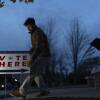Certain key economic realities have pushed the United States to its highest poverty rate ever. Doesn’t matter if you live in Detroit or Duluth- or even Boston - more Americans are suffering joblessness, or living right at the poverty line, or are being forced to rely on welfare to survive.
Each of those factors alone leave the near poor teetering on the edge of an abyss, but combined they are catapulting many down into a deep dark hole. The numbers are shocking - four out of five Americans are now in danger of falling into poverty. Four out of five?! Is that possible in one of the world’s richest countries? Apparently, yes.
In a study by the Associated Press, a group of economic experts across the ideological spectrum, scholars and social scientists, came to this grim prediction. The four Americans who are most vulnerable now must depend on a fraying safety net of social services to survive. With states refusing to enroll in the Medicaid expansion programs, and the Congress failing to renew the food stamps provision, it’s easy to understand how the risk is increasing.
And there’s something else. There are more whites on welfare than non-whites, but the Associated Press reports there is growing need among the white "near poor." Anybody who has passed by Haverhill’s Calvary Baptist Church on a Friday can see it. That’s the day the black church mans a food bank. Most of the people in line are white.
President Obama is touting an economic grand bargain to offer more economic help to middle class Americans. The president says it’s critical to ‘rebuild ladders of opportunity.’ For decades conventional wisdom has been that lifting the middle class is the best way to lift many out of poverty. But that was based on a solid middle class — a category that is shrinking.
And if you accept the numbers from the study, only one in five Americans may be able to achieve and maintain middle class status.
I was surprised that the ominous findings of this study aren’t provoking more public conversation. Is it because most of us - living with the trappings of a middle class life - don’t see ourselves as one of the four?
Washington University professor Mark Rank warns that would be a mistake. The professor told U.S. News “poverty is no longer an issue of them, it’s an issue of us.”




